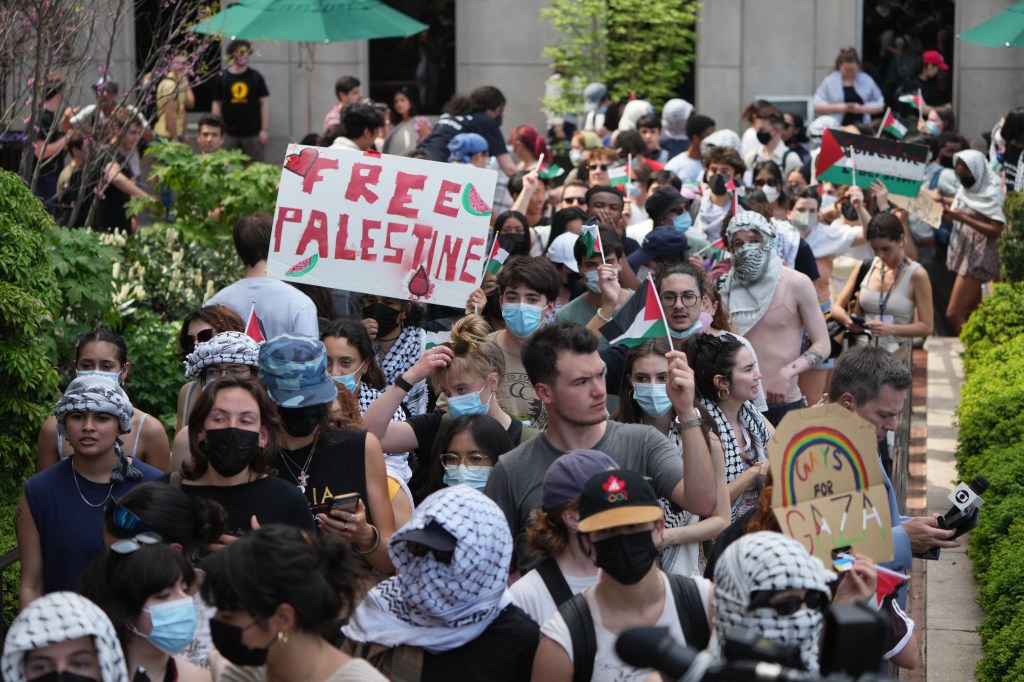As back-to-school season nears, students and faculty are preparing to return to campus — and to protests.
Pro-Palestinian protesters who wreaked havoc on Columbia University’s campus in the spring have already declared they “will be back.” The fall semester begins Sept. 3.
So what is Columbia doing about it? The big picture is unclear. But its initial strategy seems pretty thin.
In a July 24 email to students, faculty and staff, university president Minouche Shafik said her team is “working hard” on fostering community, clarifying rules and defining discrimination in anticipation of the fall semester.
“We truly flourish when we engage with different perspectives from a foundation rooted in mutual respect and a commitment to rigor and open inquiry,” Shafik said in the statement.
She is correct that freedom of speech is the cornerstone of a liberal education — something Columbia purports to offer its students — but the university’s damage-control solutions are likely too little, too late.
Radical campus activists have proven they are willing to get arrested en masse for their cause. University-sponsored bonding seems unlikely to win over their hearts and minds.
According to Shafik, the university is rolling out “community-building” programs called Dialogue Across Differences — which provides seed grants for relevant student and faculty projects — and Campus Conversations, which hosts seminars like “Exploring Freedom of Speech and Cancel Culture” and “Safety or Surveillance: How Do You Feel About Having IDs Checked.” (Notably, IDs are required for attendance.)
Additionally, the university will be adding components to new-student orientation that promote dialogue, something I’ve called on them to do in the past. It is also updating rules about campus protests and sending faculty from the Negotiation and Conflict Resolution Program to facilitate “dialogue” and “mediated outcomes” for “affected students.”
September is near, but the initiatives still seem vague. I reached out to Columbia for more information.
“Beyond the community update which you referenced, we do not have more to share at this point,” a spokesperson for Columbia told The Post.
I worry the battle is far more uphill than Shafik and her administration might be anticipating.
A May poll conducted by the Columbia Spectator found that 77% of the university’s community strongly disagreed that Shafik’s administration handled the demonstrations well.
Respondents described Shafik herself as a “bootlicker,” a “servile careerist” and “antagonistic toward the principles of liberal education.”
The only thing everyone seems able to agree on is that they’ve lost faith in the leadership.
This isn’t typical campus friction. It is a fracturing of a community, underpinned by a betrayal of free speech principles. And it promises to bleed over into the 2024-2025 school year.
After taking over the campus quad, destroying university property, and forcibly taking over an administrative building in the name of the Palestinian territories in the spring, activists returned after the semester’s end to disrupt alumni weekend — and subsequently promised, “We will be back!”
“We recommit to continue strategic, targeted attacks on all aspects of university life,” protesters declared in a post on the Students for Justice in Palestine Columbia Instagram page in June. “There will be no business as usual during genocide.”
At NYU, faculty are threatening to “refus[e] various forms of labor” if their pro-Palestinian demands — including barring the NYPD from campus and dropping charges against students disciplined for unruly protesting — are not met by August 15, according to screenshots of an email accessed by the account JewsInSchool on Instagram.
“We don’t respond to unreasonable ultimatums based on extreme, unwarranted demands,” NYU spokesperson John Beckman told The Post. “The vast majority of NYUers are here to pursue their studies and scholarship. The University will continue to safeguard our community and take appropriate steps to maintain our academic mission.”
Beckman added that NYU is holding dialogue sessions, reiterating campus guidelines, hiring a Title VI coordinator to address antisemitism and “sharpening our training on non-discrimination” ahead of the fall.
The “student intifada” at Columbia is radical and illiberal to the core. But these activists didn’t come out of a vacuum. Too many universities have fallen short on fostering free speech values for too long.
In 2022, Columbia was rated the worst school for free speech in the nation by watchdog group the Foundation for Individual Rights and Expression.
A survey conducted by FIRE last year — before the protests even broke out — found that just 10% of students felt very comfortable expressing controversial political beliefs in class, and a meager 11% did in a social setting.
Some 57% of Columbia students surveyed said they were worried about damaging their reputation if someone misinterpreted something they said. That’s hardly a campus where free expression is fostered and viewpoint diversity is celebrated.
So, while Shafik is correct to call on the community “to do as much listening and understanding as shouting and declaring,” it’s frankly absurd that it took such a cataclysmic disruption to university life for her to call for civil dialogue.













